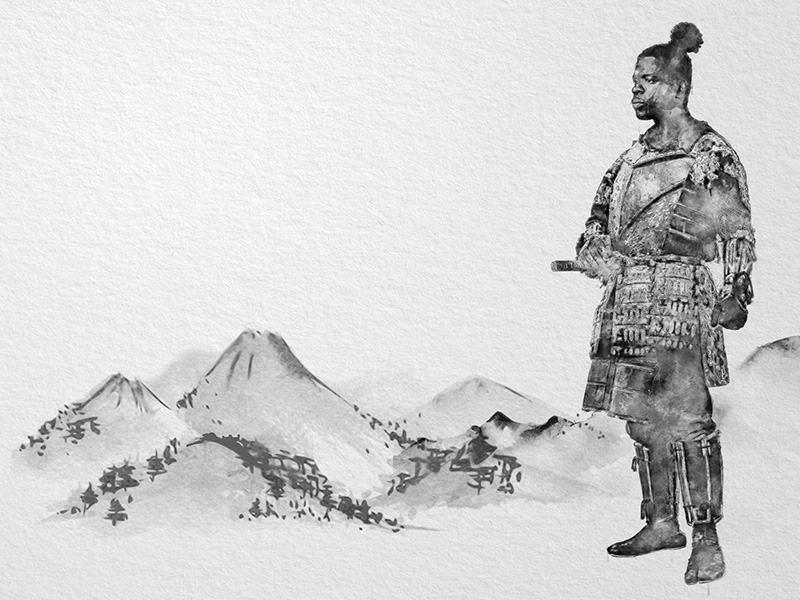Described by Black Panther actor Chadwick Boseman as “one of history’s best-kept secrets,” Yasuke is believed to be the only person of African ancestry to have reached the rank of samurai. He originally arrived on Japanese shores in 1579 as a bodyguard to Alessandro Valignano who’d been appointed to inspect the Jesuit missions in the Indies. A mysterious, muscular, six-foot-plus man from Africa, Yasuke earned celebrity-like status in Japan due to his unique appearance.
One of a kind
While African people had been coming to Japan since the 1540s, they all tended to stay out west. Accompanying Valignano, Yasuke was the first to head for the then capital Kyoto and his presence in the city caused quite a furor. Locals, who on average would have been more than a foot smaller, desperately tried to get a peek at the gigantic figure. Riots ensued with some reportedly even being crushed to death.
Hearing about these incidents, an intrigued Oda Nobunaga called for a meeting with Yasuke. The powerful warlord, known as the first great unifier of Japan, allegedly scrubbed Yasuke to check whether his skin color was real as he suspected it was black ink. After discovering it was genuine, a banquet was thrown in the African man’s honor and he was handed a significant wad of cash. Impressed by this individual who appeared to “have the strength of 10 men,” Nobunaga allowed him into his service and granted him the honor of being his sword-bearer. The pair fought in at least two battles together.
Yasuke’s existence was documented in Jesuit letters as well as Ota Gyuichi’s Shincho Koki, a chronicle of Nobunaga published during the Edo period, and Francois Solier’s 17th-century book, Histoire Ecclesiastique Des Isles Et Royaumes Du Japon. After that, the African samurai’s remarkable story was largely forgotten about until 1968 when he was depicted as a heroic character in Yoshio Kurusu’s prize-winning children’s historical fiction novel, Kuro-suke. Two years later, he featured again as a hero in Shusaku Endo’s novel Kuronbo (a derogatory Japanese word meaning black person).

Rising popularity: Yasuke in contemporary research
More recently, characters loosely based on Yasuke have appeared in various computer games, manga and anime series and he is reported to be the subject of two upcoming Hollywood films, one of which is expected to star Boseman. The most comprehensive study in English on his life can be found in the book African Samurai: The True Story of Yasuke, a Legendary Black Warrior in Feudal Japan by Thomas Lockley and Geoffrey Girard that was released last May.
“Some creative license was required here and there, but as much as possible it’s a factual book that reads like fiction because Yasuke’s story is so incredible,” Lockley tells Tokyo Weekender. “It has an immediate appeal to anyone who reads it and for me it was inspirational. While his tale is mind-bogglingly different to mine, being an immigrant in Japan, I felt a personal connection there. I think we’ve always had this idea of Japan being a very closed, racially homogenous society during the Edo period, but researching for this book I discovered it was more diverse than I anticipated with hundreds of Africans living here at that time.
“A mysterious, muscular, six-foot-plus man from Africa, Yasuke earned celebrity-like status in Japan due to his unique appearance.”
“Another reason I wanted to write it was because I love swashbuckling narratives, something that comes up and bites you in the face,” continues Lockley. “To go from being someone who was probably abducted as a child in Africa and then trafficked through the Indian Ocean to then being promoted as a bodyguard of an extremely important European before becoming a key member of the court of arguably the most infamous person in Japanese history, it’s just so romantic and unique. I don’t think there have been many stories like this in history.”
Lockley, an academic at Nihon University, first stumbled across the name Yasuke in 2009 while researching William Adams, a British samurai who became a key advisor to shogun Tokugawa Ieyasu. Though there wasn’t nearly as much information online about him then, Lockley saw big potential in the story so decided to start writing a novel that he says “included lots of material that was made up surrounded by things based on factual evidence.” That project was left unfinished, though, following the birth of his first child. He resurrected the idea a few years later as a farewell journal to a retiring colleague.
“Students are usually good barometers of what’s good or not and there was always positive feedback about Yasuke when I taught about him for my content language integrated learning course,” recalls Lockley. “Preparing something for a colleague, it seemed a more interesting topic than what I usually wrote about. By that stage [around 2016], I was more of an academic than a teacher so I knew it would be a factual research endeavor rather than something creative. I became fixated on facts and soon realized it had the legs to be much bigger than I originally planned.”

Yasuke: A mysterious figure of many talents
Co-writing the book alongside author Girard, one of the biggest challenges for the two men was trying to find information on the protagonist before he arrived in Japan and after Nobunaga’s death. His real name remains unknown and there’s uncertainty over his date and place of birth. Writing in 1627, Solier suggested he came from Mozambique; however, many historians question this assumption as his account came more than half a century after the event. According to Lockley, who interviewed the deputy ambassador of Mozambique in Tokyo, Yasuke was more likely to have been born further north, probably in what is now South Sudan as part of the Dinka tribe.
“I don’t think there have been many stories like this in history.”
“During that period, thousands of people were transported from Northern Africa to either India or the Arab world annually,” says Lockely. “Some were slaves, others were mercenaries. Indian rulers in particular loved hiring African warriors and I suspect that’s what Yasuke was before he arrived here. Valignano, who was the most important Jesuit in all of Asia, was heading into a war zone in Japan so he would have been looking for a threatening figure to be alongside. I imagine Yasuke may have been seconded to him from a warlord of some kind in India.”
More than just an imposing presence, Yasuke was a polyglot who impressed Nobunaga with his command of Japanese and tales from abroad. The two appeared to spend quite a bit of time in each other’s company and were in close proximity during the Battle of Tenmokuzan. Yasuke was also there at the famous Honno-ji Incident when Akechi Mitsuhide’s forces surrounded the temple in an attempted coup. Rather than surrender, the great daimyo committed seppuku and Yasuke immediately went to fight alongside his commander’s heir, Oda Nobutada, before being captured. As for what happened next, things are not so clear, which only adds to his mystique.

Toward a more balanced view of history
It’s no surprise Yasuke’s story has been picked up by Hollywood producers. In Lockley’s opinion, it’s an opportunity to give a more balanced view of history rather than sticking with the stereotype that all black people were slaves back then. As he discovered while researching the book, there were many people of African descent who rose to positions of power around the globe in the past, yet there’s still something extraordinary about this particular tale, and the British academic makes no apologies for writing about it.
“Do I have to be a black person to be inspired by a black person?” queried Lockley after he was asked by someone on the YouTube channel “The Black Experience Japan” why a Caucasian person would take up the task of writing the book. “That’s ghettoizing. Why can’t we all have black heroes, white heroes, Chinese heroes, Japanese heroes? I know that is a legitimate question to ask, but I say isn’t it better that we know about this guy even if it happens to be me that’s done it? The world’s going to be a better place for knowing about Yasuke’s story.”









